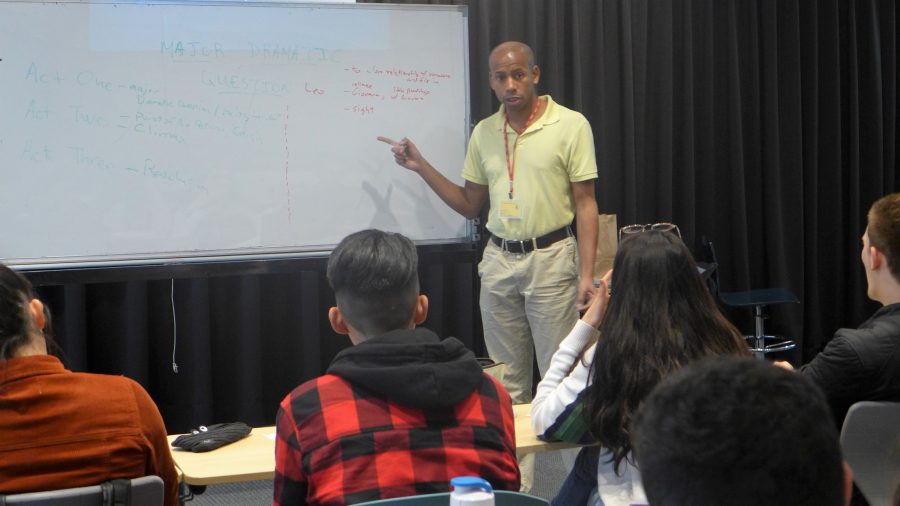“Someone might say, wouldn’t it be funny to make a play about laughing gas and elephants? It might be funny, but the piece would not have an objective,” American playwright Darren Canady said. Canady visited Taipei American School theater students from Jan.14-18, to teach the elements of scriptwriting.
Canady has won multiple awards, including the Lorraine Hansberry Playwriting Award, the Theodore Ward Prize for African-American Playwrights, and the M. Elizabeth Osborn New Play Award. His work examines America’s socio-political landscape today in relation to the historical narratives told from the perspectives of black communities of the Midwest.
Canady’s first theatrical performance was his role as Peter Rabbit in a kindergarten production, which encouraged him to continue acting by participating in annual Christmas and Easter Pageants at his church. But it was the storytelling culture of family gatherings and the accounts of his relatives that truly ignited his love of stories. “I wouldn’t be a playwright without my family background,” Canady said.
As an only child, Canady was shy and befriended his books. Acting became the cure for Canady’s social anxiety, as he dedicated his entire high school career to the performing arts. “By the time I reached college, I was open to change, sociable and unafraid to interact with people,” Canady said.
From there, he earned a creative writing degree at Carnegie Mellon University, then went to New York University, where he won the Kendeda Graduate Play Competition in his final year for his play “FALSE CREEDS.” The play follows a family working to repair their lives in the aftermath of the Tulsa Massacre of 1921. Tulsa, Oklahoma, otherwise known as “The Black Wall Street,” was home to a prosperous black community until a white mob ransacked, bombed, and set fire to the city. Despite the devastating loss that resulted in this atrocity, the event has been largely erased from American history. Canady was even concerned the public would question if the story was real. His grandmother, who had told him the tragic accounts of survivors as a boy, was gradually losing her memory to Alzheimer’s, prompting him to finish the play.
After being selected for the Kendeda Graduate Play competition, he spent the summer at the Alliance Theater in Atlanta Georgia honing the piece until its debut. “It was one of the best moments of my career, especially because it was my last piece my father saw before passing away,” Canady said. “It was a turning point for me, as up until this success I had doubts about pursuing playwriting. But that’s when I knew it was what I wanted to do.” And he did, continuing his work at Julliard.
He also continued to investigate the ways his racial and cultural roots are tied to the complex racial history of Kansas. For example, Brown v. Education, the Supreme Court case that ended de jure racial segregation in schools, was first filed in Canady’s home city of Topeka. “I’m interested in the way geography affects lives, as the black communities of New York or the West Indies are different than the black communities of the Midwest. My family has a specific flavor, in comparison.” Canady said.
“I like to find stories that carry the pioneering spirit.”
While Canady’s former instructor Marsha Norman taught him to write about what scared him the most, Canaday also draws inspiration from his passion and anger regarding political issues. “I wish there were more opportunities for performers of color, and LGBTQ people as well,” he said. In his work, Canady confronts black erasure from history and society’s evasion of racial issues. “I look for what kinds of history we hold onto,” he said. “I like to find stories that carry the pioneering spirit.”


![Sofia Valadao [Erin Wu/The Blue&Gold]
Erin Wu [Annabelle Hsu/The Blue&Gold]](https://blueandgoldonline.org/wp-content/uploads/2025/05/erin-sofia-pic.png)
![Dr. Simeondis, Mr. Anderson. [Annabelle Hsu/The Blue&Gold]](https://blueandgoldonline.org/wp-content/uploads/2025/05/teachers-1200x675.jpg)
![[PHOTO COURTESY OF UNCULTURED, JUNIPER AND CO.]](https://blueandgoldonline.org/wp-content/uploads/2025/05/student-businesses-1200x675.png)
![Photo of the girl's varsity badminton team [PHOTO COURTESY OF TAS ATHLETICS]](https://blueandgoldonline.org/wp-content/uploads/2025/05/BadmintonTeam-04839-1200x675.jpg)
![The Institute for Speech and Debate, now based all across the east coast of the US. [PHOTO COURTESY OF MR. WILLIAMS]
Mr. Morris' various ceramic artwork. [PHOTO COURTESY OF MR. MORRIS]](https://blueandgoldonline.org/wp-content/uploads/2025/05/Untitled-design-1-1200x918.png)
![Mr. Castro celebrates at the finish line. [PHOTO COURTESY OF MR. CASTRO]](https://blueandgoldonline.org/wp-content/uploads/2025/04/20240513_092650124_iOS-e1745300337344-1200x1116.jpeg)